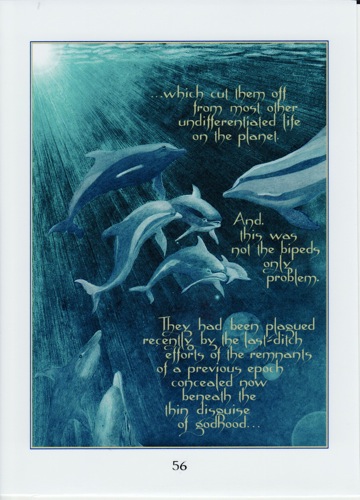The Helianx Proposition/page 56
Noe's discovery of the lemur community triggered in hir a renewed sense of excitement.
SHe had spent so much time on the planet, even for a Helianx,
that sHe had started to wonder whether this encounter would ever take place.
Hir relief, too, was profound and sHe had to resist a strong urge to observe and nurture this
precious find, and to be available to protect them should danger ever seriously threaten them.
The lemurs had seemed so small and fragile. Chasing these thoughts out of hir mind, Nbe retreated once again back into the welcoming ocean.
More millions of years passed. The continents continued in their inexorable movement, inching their way to their current positions. Mountain ranges sprung up as tectonic plates collided. Shock waves intermittently rippled around the planet when volcanoes erupted in massive explosions. Ice sheets periodically advanced from the poles, lowering the sea levels and cooling the waters before retreating once again, leaving ravaged landscapes in their trail.
Noe, remembering the computers' admonition, restricted hirself to an occasional short flight over the land, making sure to observe the emerging bipeds from a distance. Groups of these aquatic apes hugged the sea shores and river estuaries of the warmer regions, grubbing for shell fish and bobbing and diving in the shallow waters. Noe noted how spending their lives in and out of sea had allowed these apes to spend more and more of their time upright on their hind legs, which in turn, had freed up their front limbs for more effective foraging. SHe was also astonished at the rapid growth of their brains, fed, as sHe had discovered, by the omega-3 fatty acids sHe knew to be so richly present in the marine food chain.
Noe intuitively understood that this was a group upon which sHe should keep surreptitious eyes. Other slightly different primates, now down from the trees, had spread out over the savannas, mixing and crossbreeding with yet other primates, and following the seasons and the migrations of the game. As their numbers grew, clans and then tribes had arisen, ferociously defending their territory and venturing further and further into the comparative safety of uninhabited hinterlands. An ever-curious species, they rapidly expanded to every habitable region they could reach, sometimes crossing landbridges to find entirely new unexplored territories beyond. But, as Noe well knew, it had not been easy.
Noe watched nervously, as mass extinctions wiped out whole populations--diseases would sometimes run unchecked through an entire tribe, decimating it; famines had struck, challenging the creatures--when not killing them--to find new sources of food. Different nomadic groups had clashed, doing their best to exterminate one another; and most disturbing for Noe, it seemed that of all the mammals on this richly endowed planet, these particular primates were by far the most vulnerable. Not equipped with venom, tooth or claw, they had only their cunning and their willingness to act collaboratively. And although they appeared to live most of their short lives in a state of constant fear, Noe was relieved to see that they were also capable of great courage.
